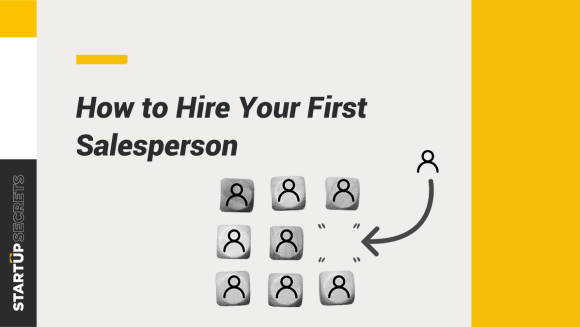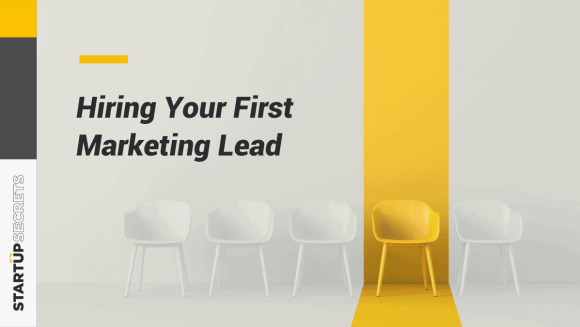“You’d be surprised at how many founders just google job descriptions and copy and paste from different samples to create their own haphazard one,” says Gabriela Serret-Campos, VP of People Operations at Chronosphere. “Then they just select the first candidate that meets their gut feel.”
That’s what it looks like when you hire without any intentionality, something Gabriela says early-stage startups do all the time.
But your first hires can make or break your company. So how do you make sure you hire and retain the talent that will thrive at your company and take your business to new heights?
It comes down to three key things: defining your culture authentically and early, leading an intentional interview process, and providing a consistent, values-aligned employee experience.
Define Your Company Values and Culture Early
“Any human can be an A+ person if they’re in an organization where there’s alignment on values and what they’re trying to achieve,” says Gabriela.
By articulating your cultural values, you create a blueprint for the type of hires that are likely to succeed at your company. On the flip side, Gabriela says, values help the right people find you; if the values you list on a job description resonate with a great candidate, they’ll likely apply.
To identify your cultural values, Gabriela asks:
- What characteristics have organically made an impact on your organization so far?
- What company traits got you through hard times and “fox hole moments?”
- What stories do you share with friends and family about your company? What recurring themes do you notice?
- Which of these values are truly non-negotiable?
Without being intentional, accidental values can emerge haphazardly, but you may not want your company to operate in these ways. Be forewarned: Culture is much harder to change down the road.
Have Your Employees Stress Test Values
“Employees should feel a sense of ownership over and a personal connection to the values of the company,” says Kathy Breslin, VP of People at Trux.
“As a company evolves, its values may change with it,” she adds. “Do the values still resonate? Does everyone still feel connected to them? If the synergy is no longer there, this can be a demotivating culture killer.”
Kathy recommends testing your values with employees on the front lines by:
- Gathering feedback through surveys
- Brainstorming together at town halls
- Soliciting opinions through a Slack channel
Create an Intentional Interview Process
An intentional interview process weaves your core values throughout it—from writing your job description to crafting interview questions. To help the right talent move through your hiring funnel:
- Outline the skills, abilities, and values needed in the role
- Write a simple job description
- Determine your interview flow
- Create an interview scorecard
- Prepare your interview panel
- Lay your own internal ground rules
>> Read our full guide to designing an interview process.
Note: To help prevent unconscious bias from leaking into the process, be sure to emphasize skills over degrees, avoid using gendered language in the job description, and have a consistent scorecard you can use to objectively compare candidates.
Check for Values Alignment Throughout the Process
Probe for the candidate’s core values during interviews, paying attention to their thought process versus their exact answer.
For example, since Gabriela’s last company helped small businesses, she often asked candidates about their connection to SMBs. Some other suggestions could be:
- If teamwork is a core value, partner a candidate with an employee on their take-home assignment.
- If feedback is a core value, host a feedback session after a candidate’s presentation to see how they respond.
Kathy takes a broader approach, always asking standard, open-ended questions in interviews to test a candidate’s alignment with company values, such as:
- How did you impact the business in your past role?
- What would your boss say if I asked them where you moved the business forward?
For more of Kathy’s questions, check out her Sample Interview Scorecard.
Engage Candidates with Values-Driven Touchpoints
Closing a candidate isn’t something you kick into gear at the end of the interview process. You must weave it into the entire process; every engagement is an opportunity to showcase your company culture, values, and why this candidate should work with you. So think outside of the box.
For example, one reason why Gabriela joined Chronosphere? After mentioning her support for Argentina in an upcoming soccer match against Brazil, her interviewer mailed her an Argentine jersey with a note:
“With you on this team, we can be champions, too!”
Startup Secret: Surprise and delight candidates throughout the interview process, especially those who will 10x your company.
Provide a Consistent, Values-Aligned Employee Experience
An exceptional employee experience attracts and retains great talent. It starts at a candidate’s first touchpoint with a company, solidifies during the interview process, and continues throughout an employee’s tenure with the company.
You’re Not That Special
A mistake Gabriela sees early-stage founders make is thinking their company, mission, and culture are distinctly unique from other startups—and that uniqueness is obvious to other people.
“Yes, your company is your baby, but while you might love your baby, it can be ugly to someone else,” she says. “So many founders say they’re different because of XYZ, but there are many other companies that are pitching the exact same thing. You have to be ready to defend it.”
That’s where an employee value proposition (EVP) comes into play. An EVP is the whole package of the experience you provide employees. Culture is a hugely important element of an EVP, but it also includes:
- Compensation (salary and equity)
- Benefits
- Professional development
- Onboarding
Startup Secret: Instead of just saying, “We’re a startup saving the world,” acknowledge your company’s growing pains and share a unique employee value proposition.
Benefits are Just as Important as Compensation
Even if you provide great compensation, there’s always another company that will pay your candidate more. You have to differentiate in other ways. One way to do that is through long-term, meaningful benefits.
Instead of pre-Covid benefits like free lunches, group exercise classes, and beer, Gabriela suggests prioritizing things like job security and exceptional health insurance.
Think about your values. What benefit might enable your team to live that value?
Make Time for Onboarding
Lastly, once your new hires start their roles, make time to onboard them. “Sink or swim is a cop-out,” says Kathy. “You need to invest the time upfront.”
You could hire the absolute best talent, but if you don’t onboard them properly, they might fall short of their potential—which could lead to turnover.
At the very least, Kathy suggests that onboarding include:
- An intro to the CEO and/or founder
- A break down of core values and mission
- The strategic plan/vision for the next two to five years
- A product demo with the Head of Product
- An in-depth customer overview
- At least one conversation with an actual customer
- A summary of competitors
Ultimately, as with benefits, your values should help inform your onboarding.
- Do you value transparency? Dig deep into the company’s current state of affairs, progress, and goals.
- Is collaboration a core value? Spend a healthy chunk of time introducing new hires to the team and helping them build relationships.
In all, Gabriela asks, “Are you fostering an environment in which a hire can be successful and thrive?”
These three elements—defining culture, creating the right interview process, and providing a consistent employee experience—may feel like a heavy time investment, but they will be well worth the effort when you find, and keep, the right startup talent.











